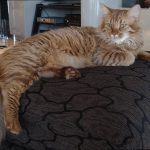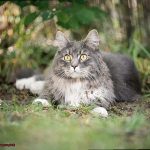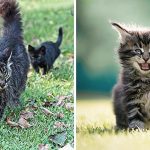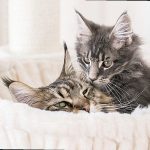Prepare to be captivated by the enigmatic allure of Maine Coons – those majestic, gentle giants that grace our lives with their presence. With their regal size, mesmerizing coats, and captivating personalities, it’s no surprise that cat enthusiasts worldwide have fallen head over paws for them. However, let’s not turn a blind eye to the fact that even these magnificent creatures can display aggressive tendencies on occasion. In this blog post, we’re about to debunk all the myths surrounding Maine Coon aggression. We’ll delve into the factors that may trigger their occasional feisty behavior and provide you with valuable insights on how to foster a secure and harmonious bond with these extraordinary felines. So buckle up and get ready to separate truth from fiction when it comes to Maine Coon aggression.
Do Maine Coons ever get aggressive
Maine Coons are renowned for their friendly and gentle demeanor, but just like any other cat breed, they can display aggression under specific circumstances. In this article, we will delve into the factors that can contribute to aggressive behavior in Maine Coons, while emphasizing that it is not a common trait for this beloved breed.
Fear and Anxiety:
Maine Coons can become aggressive if they feel threatened or unsafe in their environment. Loud noises, unfamiliar surroundings, or the presence of other animals can trigger fear or anxiety, leading to defensive aggression. Creating a calm and secure atmosphere is essential to prevent such behavior.
Territorial Behavior:
With a strong instinct to protect their territory, Maine Coons may exhibit aggression towards other animals or even humans they perceive as intruders. Introducing a new pet into the household or encountering unfamiliar individuals can provoke territorial aggression.
Socialization and Upbringing:
Proper socialization during the kitten stage plays a vital role in preventing aggression issues. Kittens that have not been exposed to various people, animals, and environments may be more prone to aggressive behavior later on. Early socialization is crucial in shaping their behavior and fostering positive interactions.
Medical Conditions and Pain:
Aggression in Maine Coons can also stem from underlying medical conditions or pain. Sudden changes in behavior should prompt a visit to the veterinarian to rule out any health issues that may cause discomfort or pain, leading to aggression.
Causes of Aggression in Maine Coons
Causes of Aggression in Maine Coons: Unmasking the Fierce Side of These Majestic Beasts.
Ah, the Maine Coon. With their striking looks and gentle demeanor, they have captured the hearts of cat lovers around the world. But did you know that even these regal creatures can have a fiery side? Yes, it’s true. Sometimes, our beloved Maine Coons can unleash their claws and display aggression that leaves us scratching our heads. But fear not, fellow cat enthusiasts. In this captivating blog post, we will explore the potential causes of aggression in Maine Coons, shedding light on the mysteries behind their occasionally fierce behavior.
- Genetics: It seems that even in the world of cats, genetics can play a significant role. Some experts believe that certain genes can predispose Maine Coons to be more prone to aggression. Think of it as their wild ancestors whispering in their ears, reminding them of their survival instincts.
- Lack of socialization: Just like humans, cats need their fair share of socializing. If our fluffy friends don’t get exposed to various people, animals, and environments during their critical socialization period, they may become fearful or aggressive towards anything unfamiliar.
- Fear and anxiety: Maine Coons experience fear and anxiety just like we do. In situations where they feel threatened or stressed, they may resort to aggression as a way to protect themselves or establish boundaries. After all, even the toughest lions have their moments of vulnerability.
- Environmental factors: Picture this – a household filled with constant noise, chaos, and stimulation overload. Sounds stressful, right? Well, for our Maine Coon friends, it can be a recipe for aggression. A peaceful and calm environment is essential for these majestic beasts to thrive.
- Medical issues: Ah, the hidden culprits. Sometimes aggression in Maine Coons can stem from underlying medical problems. Imagine having a toothache or dealing with an infection – wouldn’t you be grumpy too? It’s crucial to rule out any health issues before addressing behavioral concerns.
- Lack of mental stimulation: Maine Coons aren’t just pretty faces; they’re highly intelligent creatures. Without enough mental stimulation in their daily routine, they can become bored and frustrated, leading to aggressive outbursts. So keep those whiskers twitching with plenty of puzzles and toys.
- Territoriality: Maine Coons take their territory seriously. If they feel their space is being invaded or threatened by other animals or individuals, they may resort to aggression as a means of protecting their kingdom. After all, who wouldn’t defend what’s rightfully theirs?
How to Identify Aggressive Behavior in a Maine Coon
Maine Coons are known for their friendly and gentle nature, but like any other cat breed, they can exhibit aggressive behavior in certain situations. As a responsible cat owner, it is crucial to be able to identify signs of aggression in your Maine Coon to address the issue promptly and ensure the safety and well-being of everyone involved.
Physical Aggression:
Physical aggression in Maine Coons can involve biting, scratching, or lunging at humans or other animals. This behavior is often accompanied by hissing, growling, or showing their teeth. If you notice such aggressive behaviors, observe their body posture – an upright tail, raised fur, and a tense body usually indicate aggression.
Verbal Aggression:
Maine Coons may display verbal aggression through excessive meowing, growling, or hissing without any apparent reason. They may also make loud and aggressive vocalizations when they feel threatened or stressed. Pay attention to their low-pitched rumbling sound when they are agitated.
Territorial Aggression:
Territorial aggression is common in Maine Coons who feel the need to protect their space. They may become aggressive towards other cats or animals that they perceive as intruders. If your Maine Coon exhibits this behavior, it is essential to provide enough resources and space for each cat in a multi-cat household.
Fear-Based Aggression:
Aggression in Maine Coons can also be triggered by fear or anxiety. Watch for signs of discomfort or fear when approaching or touching your cat. They may flatten their ears, raise their fur, or try to hide when feeling threatened. Gradual exposure to triggering stimuli and creating a safe environment can help manage fear-based aggression.
Predatory Aggression:
Predatory aggression is instinctual in cats and may manifest as stalking, pouncing, and biting. While more commonly seen in outdoor Maine Coons, it is important to redirect this behavior towards appropriate toys and play activities.
Fear-Based Aggression in Maine Coons
Fear-based aggression in Maine Coons can pose challenges for owners, as it may lead to uncomfortable or even dangerous situations. However, with proper understanding and proactive measures, this issue can be effectively managed. In this section, we will delve into the causes of fear-based aggression in Maine Coons and discuss practical strategies for addressing it.
Causes of Fear-Based Aggression
Maine Coons are generally known for their friendly and sociable nature. However, they can display aggression when they feel threatened or scared. It is important to remember that fear-based aggression is a defensive response rather than a deliberate act of aggression. Some common triggers for fear-based aggression in Maine Coons include:
- Unfamiliar people or animals
- Loud noises
- Sudden movements
- Stressful situations
Identifying Fear-Based Aggression
It is crucial for owners to be able to recognize the signs of fear-based aggression in their Maine Coons. These signs may include:
Addressing Fear-Based Aggression
To address fear-based aggression in Maine Coons, owners should focus on creating a safe and secure environment for their cats. Here are some practical strategies:
- Provide hiding spots: Maine Coons should have access to hiding spots where they can retreat when they feel threatened.
- Create a calm living space: Ensure that the environment is quiet and free from excessive noise or commotion that could trigger fear.
- Gradual exposure to new experiences: Introduce new experiences or individuals in a controlled manner, allowing the cat to gradually adjust and build confidence.
- Building trust: Use positive reinforcement techniques such as treats, praise, and play to reward calm and non-aggressive behavior, building trust with your Maine Coon.
- Seek professional help: In severe cases of fear-based aggression, it may be necessary to consult a veterinarian or animal behaviorist who can provide guidance on behavior modification techniques and recommend appropriate medications if needed.
Patience and Understanding
Dealing with fear-based aggression in Maine Coons requires patience and understanding. Consistent training, socialization, and a supportive environment can help many Maine Coons overcome their fears and exhibit less aggressive behavior over time.
Territorial Aggression in Maine Coons
Unleashing the Secrets of Fearful Felines: Taming the Wild Maine Coon Within
Territorial aggression in Maine Coons is as natural as a cat chasing its own tail. These majestic felines have an innate need to protect their turf from any perceived threats. So, if you’re a proud owner of a Maine Coon, it’s essential to understand and manage their territorial instincts to maintain harmony within your feline kingdom.
The Battle Begins: Understanding Territorial Aggression in Maine Coons
Territorial aggression can manifest in various ways, from mild warning signals like hissing and growling to full-blown attacks. Each Maine Coon has its own unique intensity, just like snowflakes falling on a winter’s eve. It’s important to remember that this behavior doesn’t make your furball inherently violent or ill-tempered – they’re just fiercely protective of their domain.
Unmasking the Triggers
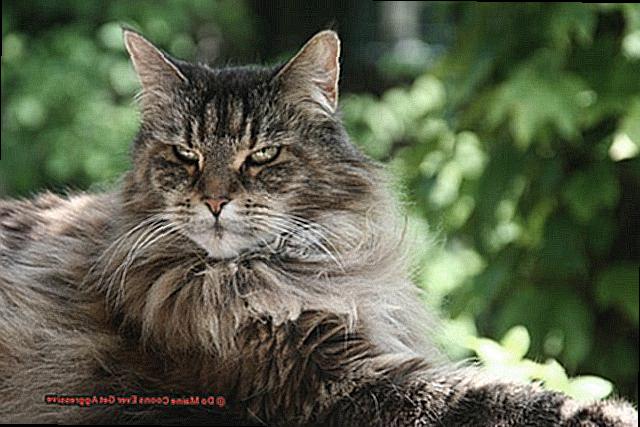
To effectively manage territorial aggression, you must first uncover the triggers that set off your Maine Coon’s inner warrior. Common culprits include the presence of unfamiliar cats or animals, changes in the environment, or disruptions within the household dynamic. Keep an eye out for these triggers and work towards minimizing them to maintain peace and harmony.
Building Fortresses: Providing Security for Your Maine Coon
Creating a safe and secure environment for your Maine Coon can work wonders in reducing territorial aggression. Think of it as building a fortress fit for a king (or queen) – complete with scratching posts, cozy hideaways, and high perches to survey their kingdom. This will help boost their confidence and reduce their sense of threat.
Separate Spaces for Peaceful Coexistence
Just like humans need personal space, Maine Coons thrive when they have their own territory within the household. By creating separate spaces for each cat, you can minimize conflicts and territorial disputes. It’s like giving each cat their own room, complete with “do not disturb” signs and a “my space, my rules” mentality.
The Neutering Solution
If your Maine Coon’s territorial instincts are causing too much strife, consider the option of neutering or spaying. This can help decrease their territorial drive and minimize aggressive behaviors. It’s like taking the edge off a roaring lion, making them more docile and peaceful.
Seek Professional Guidance
If all else fails, don’t hesitate to seek advice from a professional animal behaviorist or veterinarian who specializes in cat behavior. They wield the knowledge and expertise to develop a tailored behavior modification plan that will bring peace back to your feline kingdom.
Stress-Related Aggression in Maine Coons
Maine Coons are known for their gentle and friendly nature, but just like any other breed of cat, they can exhibit aggression when under stress. As a responsible cat owner, it is crucial to understand the common stressors that can trigger aggression in Maine Coons and take proactive steps to minimize their impact. Here are some practical strategies to reduce the risk of stress-related aggression in your Maine Coon:
Create a Safe and Comfortable Environment:
- Provide a designated safe space for your Maine Coon where they can retreat when feeling overwhelmed or anxious. This can be a separate room or a cozy corner with their bed, toys, and scratching post.
- Ensure that your home environment is calm and quiet. Avoid exposing your Maine Coon to loud noises or sudden disruptions that can cause stress.
Establish a Consistent Routine:
- Maine Coons thrive on routine and predictability. Establish a daily schedule for feeding, playtime, and litter box maintenance to provide a sense of stability and security.
- Gradual introductions to new people, pets, or changes in the household should be done slowly and cautiously to prevent overwhelming your Maine Coon.
Provide Mental and Physical Stimulation:
- Maine Coons are intelligent cats that require mental stimulation to keep them engaged and content. Offer interactive toys, puzzle feeders, and scratching posts to keep their minds occupied.
- Regular play sessions with interactive toys or feather wands can help release pent-up energy and prevent boredom.
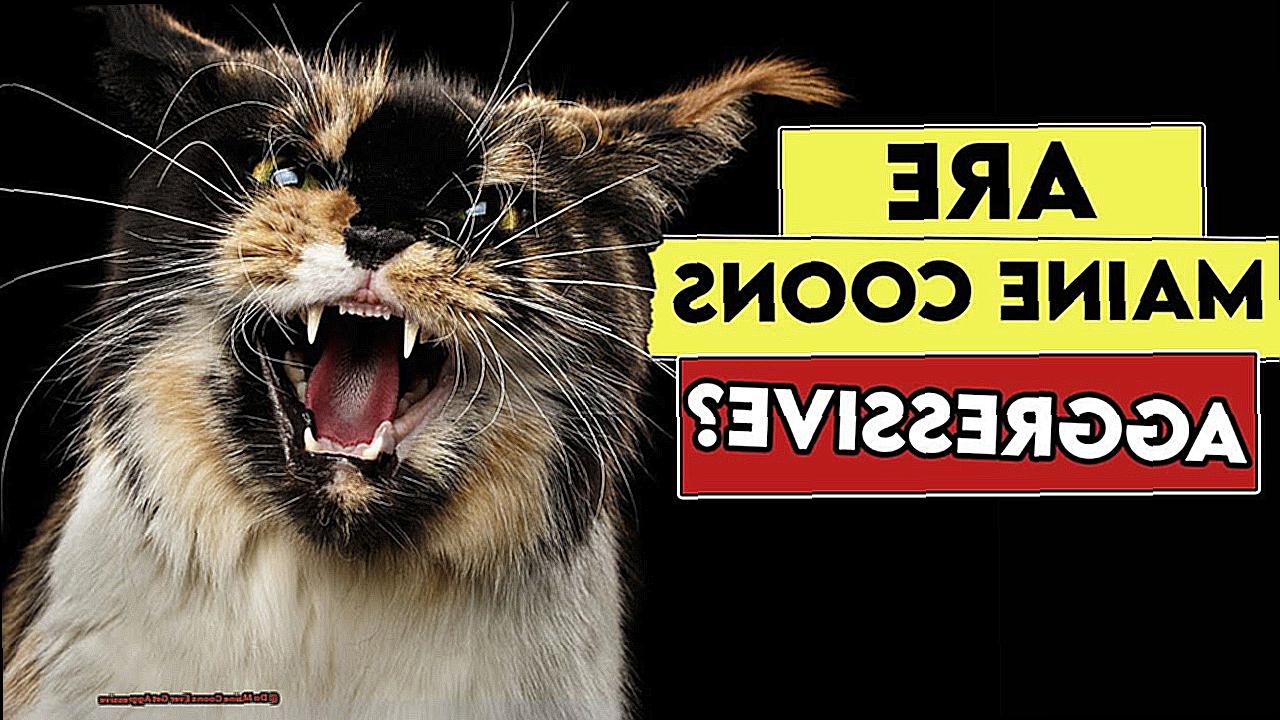
Seek Professional Help if Needed:
- If your Maine Coon continues to exhibit aggressive behavior despite your efforts, it may be beneficial to consult with a veterinarian or a professional animal behaviorist.
- They can provide expert guidance tailored to your cat’s specific needs and may recommend behavior modification techniques or medication if necessary.
Medical Issues That May Cause Aggression in Maine Coons
In this article, we will explore common medical conditions that can cause aggression in Maine Coons, shedding light on the importance of understanding and addressing these health concerns.
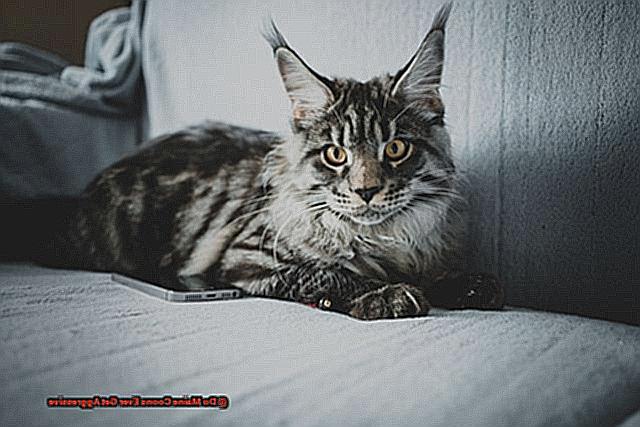
Pain or Discomfort:
Maine Coons are masters at hiding pain, so it’s essential for owners to be vigilant. Look out for signs such as increased aggression or sensitivity to touch. Painful conditions like arthritis or dental problems can make your gentle giant act out. Consult with a veterinarian to diagnose and treat the source of your Maine Coon’s discomfort.
Hormonal Imbalances:
Unneutered male Maine Coons may display aggression due to high testosterone levels, while females in heat may become more aggressive in their search for a mate. Spaying or neutering your cat can help regulate hormone levels and reduce aggressive tendencies.
Neurological Disorders:
Neurological conditions like feline hyperesthesia syndrome (FHS) or cognitive dysfunction syndrome (CDS) can lead to aggression in Maine Coons. FHS causes increased sensitivity along the back and tail region, triggering aggressive behavior. CDS, similar to dementia in humans, can cause confusion and disorientation, leading to irritability and aggression. Consult with a veterinarian to manage these conditions effectively.
Medication Side Effects:
Certain medications prescribed for other health issues can have behavioral side effects, including aggression. Steroids, commonly used for inflammation or allergies, may cause changes in behavior in some cats. Monitor your Maine Coon closely while on medication and consult with your veterinarian if concerning aggression occurs.
Socialization and Training to Prevent or Minimize Aggression in Maine Coons
Maine Coons are known for their friendly and sociable nature, but without proper socialization and training, aggression can become a concern. In this article, we will explore how socialization and training can help prevent or minimize aggression in Maine Coons, ensuring a harmonious relationship between cat and owner.
The Power of Socialization
- Introduction to the importance of socialization in preventing aggression.
- Start socializing Maine Coons from a young age to expose them to different experiences.
- Gradually introduce them to various people, animals, and environments.
- Use positive reinforcement and rewards to associate positive experiences with new stimuli.
- Discuss the role of fear-based aggression and how socialization can reduce its occurrence.
- Share personal experiences or anecdotes of successful socialization with Maine Coons.
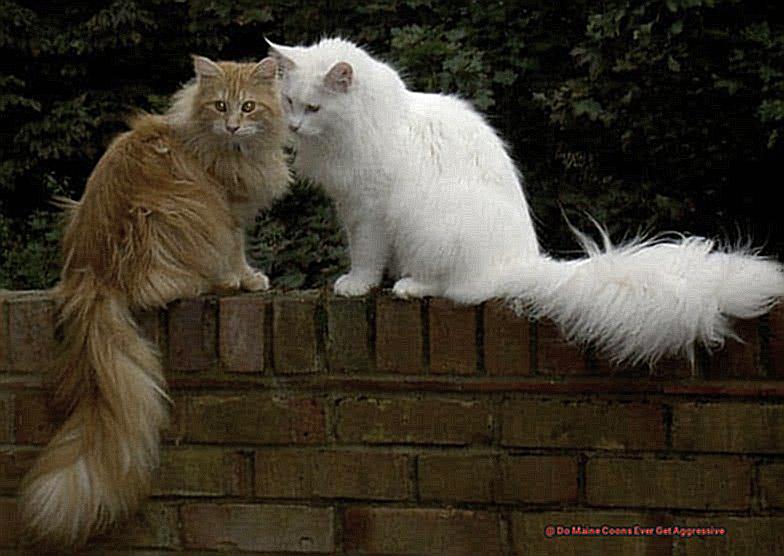
Training for Better Behavior
- Basic obedience training establishes boundaries and control for Maine Coons.
- Teach commands like sit, stay, and come to prevent frustration-based aggression.
- Emphasize positive reinforcement training methods over punishment-based approaches.
- Explain the importance of rewarding desired behaviors with treats, praise, or playtime.
- Share personal training success stories to engage readers and showcase expertise.
vIndividual Factors and Seeking Professional Help
- Acknowledge that individual personalities may still play a role in aggression.
- Genetic factors or past experiences can influence a Maine Coon’s predisposition to aggression.
- Encourage readers to consult with a professional animal behaviorist or veterinarian for guidance if aggression persists.
- Provide resources or tips on finding reputable professionals in the field.
Playtime and Mental Stimulation
- Highlight the importance of regular play sessions and mental stimulation for Maine Coons.
- Address their high energy levels and need for physical outlets.
- Suggest interactive toys, puzzles, and supervised outdoor activities to prevent boredom-related aggression.
- Provide personal recommendations for engaging toys or activities.
Neutering or Spaying Your Maine Coon to Reduce Aggressive Tendencies
Maine Coons are majestic and gentle giants, but like any other cat breed, they can exhibit aggressive behaviors. If you’re a proud Maine Coon parent, you may be wondering what steps you can take to reduce these tendencies. One highly effective method is neutering or spaying your furry friend. In this article, we will explore how this simple procedure can help calm the wild beast within your Maine Coon.
Why Neutering or Spaying Makes a Difference:
Neutering or spaying your Maine Coon has numerous benefits beyond preventing unwanted litters. Let’s delve into the specific reasons why this procedure can help reduce aggressive tendencies:
Hormonal Regulation:
Hormonal changes can significantly impact a cat’s behavior, and Maine Coons are no exception. Neutering or spaying helps regulate these hormones, reducing aggression linked to mating instincts.
Male Maine Coons and Territorial Aggression:
Unneutered male Maine Coons have a strong need to establish their territory, which can lead to aggressive behaviors like fighting with other cats and territorial marking through spraying. Neutering males significantly reduces these tendencies.
Female Maine Coons and Heat Cycle Aggression:
Unspayed female Maine Coons experience intense hormonal fluctuations during heat cycles, which can cause heightened aggression. By spaying your female Maine Coon, you eliminate these hormonal imbalances and associated aggressive behaviors.
Calming Effect on Cats:
The surgical removal of reproductive organs during neutering or spaying can have a calming effect on cats. This helps reduce stress and anxiety, leading to a more balanced and peaceful temperament.
Preventing the Development of Aggressive Behaviors:
It is recommended to neuter or spay Maine Coons at an early age, preferably before they reach sexual maturity. This proactive approach can prevent the development of aggressive behaviors associated with mating instincts.
Conclusion:
Neutering or spaying your Maine Coon is not only responsible pet ownership but also an effective way to reduce aggressive tendencies in these majestic cats. By regulating hormones, preventing territorial and heat cycle aggression, and promoting overall calmness, this procedure contributes to the well-being and happiness of your feline companion.
Remember to consult with your veterinarian to determine the best time for neutering or spaying and address any specific concerns you may have. Let’s tame the wild beast within our Maine Coons and enjoy their gentle and loving nature to the fullest.
Also Read: Can You Return A Cat You Adopted From Petsmart
Conclusion
Maine Coons, known for their gentle and friendly nature, are generally not prone to aggression. However, like any other cat breed, they may display aggressive behavior under certain circumstances. It is important to understand that aggression in Maine Coons is relatively rare and usually stems from specific triggers or situations.
One common trigger for aggression in Maine Coons is fear or feeling threatened. If a Maine Coon feels cornered or scared, they may react defensively and exhibit aggressive behavior. This can include hissing, growling, swatting, or even biting. It is crucial to respect their personal space and provide them with a safe environment to avoid triggering such reactions.
Another factor that can contribute to aggression in Maine Coons is territoriality. As natural hunters and explorers, these cats have a strong instinct to protect their territory. They may become aggressive towards unfamiliar animals or humans who invade their space. Proper socialization from an early age can help minimize territorial aggression in Maine Coons.
Furthermore, pain or discomfort can also lead to aggressive behavior in Maine Coons. If a cat is suffering from an injury or illness, they may lash out due to the discomfort they are experiencing. Regular veterinary check-ups and prompt medical attention are essential in maintaining your Maine Coon’s health and preventing potential aggression caused by underlying issues.
It is worth noting that genetics play a role in determining a cat’s temperament, including the likelihood of displaying aggressive behavior. Responsible breeders prioritize breeding for good temperament traits, minimizing the chances of aggression being passed down through generations of Maine Coons.
In conclusion, while it is uncommon for Maine Coons to exhibit aggression, it is important for owners to be aware of potential triggers and take necessary precautions.
